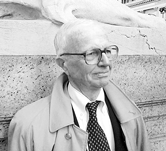By Jane Flanagan
Have you ever considered writing a memoir? Me, too. Started yours yet? Right, I haven’t either. That’s why I’m grateful to Bill Zinsser, a teacher at New School University, for publishing his most recent book, “Writing About Your Life — A Journey Into the Past.”
If there is anyone who can effectively coax me along such a path — it’s him. Let me tell you why. Bill Zinsser has been writing and editing nonfiction books and articles for 60 years. For the past decade he’s led a New School course entitled “People and Places.” One day in the early ’90s I showed up for class and couldn’t seem to leave. I returned three more semesters.
Bill thought this was odd. It was, after all, the same damn course. There was something odd, all right, me. For some reason I crave to hear things over and over. I don’t know how to explain this exactly. The best I can come up with is that certain things — writing for sure — hits me in layers. The first time 10 percent gets through, the second, maybe 18 percent, etc., etc.
But to be honest, there was something else. I needed to be in that class. Writing is lonely, hard work even if you have some idea of what you’re doing. If you don’t, it’s really lonely. It was so comforting there. Bill is astonishingly non-judgmental. It’s not that he doesn’t have standards, he does. High ones. But it’s the integrity of the effort that he respects, regardless of where you start from. Some of us in the class hadn’t written anything beyond an office memo.
It’s just this kind of comforting presence that accompanied me throughout this book. If the name “William Zinsser” sounds familiar to you, check your bookshelf. You might just find a copy of “On Writing Well,” his bible for nonfiction writers. I was assigned to read it in college and have been referring to it ever since. Bill first published “On Writing Well” in 1976 and it has since sold over a million copies.
I knew the basic outline of his life — editor at the New York Herald Tribune, writer for magazines like the Saturday Evening Post, an intrepid traveler and diehard New Yorker. But I wanted to know more.
I was in luck because in “Writing About Your Life, ” he tells me. Bill is now in his early 80s, and his publisher was after him to write his memoir for years. But he only agreed to do it in the form of a “how to” for others.
The book includes the best advice I’ve found on writing a memoir: “Think of it as a pencil sketch, construct a compelling narrative and start by each day reconstructing a vivid memory. Then go about your life. Put out of your mind that you are embarking on a longer project.”
But I was particularly interested in the story of his life. I especially wanted to know about the teachers who shaped him. My favorite was the head of the New England prep school Bill attended — Frank Boyden at Deerfield Academy. Bill describes his early Deerfield days playing for the midget rather than the varsity team. He felt equally valued because Boyden made sure the equipment and buses were the same. “The integrity of the effort was validated, whatever our level or talent,” he said.
He also writes that Boyden understood the vulnerabilities of adolescent boys. “Within that community of male friends I never doubted my freedom to be myself.” Reading this, I was surprised by how much the values reverberated. Then I realized. I encountered them in that New School classroom.
Another teacher was Robert Root, dean of the faculty at Princeton. Bill went to see him after WWII, hoping to receive enough credits from his overseas studies to complete his B.A. degree. Bill describes the scene as this man, the prototype of a stern, old professor, listened to the young soldier describe his travels. Suddenly Root stopped counting credits and started listening. “Numbers weren’t as important to him as learning.”
When I finally write that memoir, I’m not sure I’ll unearth a Boyden or a Root in my formal schooling. But, that’s O.K. I found Zinsser at the New School.






































